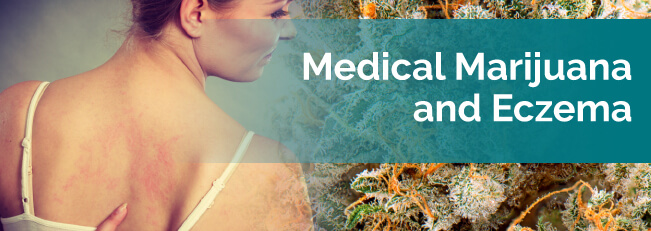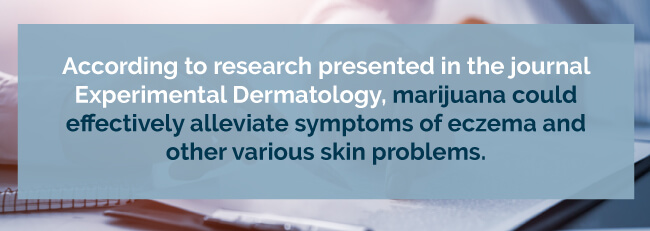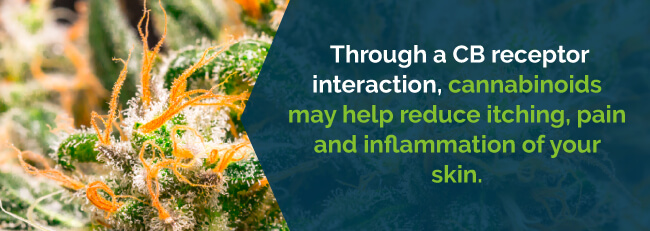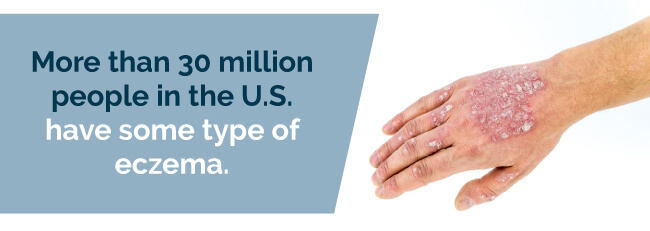
If you have eczema, you’ve probably learned by now you can’t scratch your itchy skin — or more appropriately, you shouldn’t scratch it. Scratching can make your eczema worse and can lead to infection, particularly if you claw at it so much you bleed. Medical marijuana for eczema has been shown to alleviate the itching, swelling and redness symptoms this ailment and other types of inflammatory skin conditions create.
Your skin contains immune cells to help your wounds heal quickly and protect you from harm. Medical cannabis for eczema interacts with these cells. When you apply it topically, the herb’s compounds bind to the cell receptors located in your skin’s immune cells. This helps when you’re experiencing an allergic rash.
Cannabis’s active compounds, cannabinoids, are immuno-suppressant, meaning, they dampen your immune system. When your skin flares up from a rash, your skin’s immune cells trigger an inflammatory response.
The inflammatory response in patients with eczema can get out of control. Your skin could get particularly sensitive to things like pollen, soaps or dog and cat dander. Stress or exposure to irritants may cause a flare up, and it may be hard to calm down your immune system after it begins. The reaction of your immune system is more intense to stimuli than usual.
Applying marijuana and eczema topical oils or creams to affected areas can reduce the inflammatory response, cutting down on the irritation and allowing your skin to heal. Also, there are no associated side effects with cannabis cream like there are with steroids.
According to research presented in the journal Experimental Dermatology, authors reported many times marijuana could effectively alleviate symptoms of eczema and other various skin problems. As mentioned, the cannabinoids in medical weed have immunosuppressive properties and make them a potential therapeutic agent to treat inflammatory skin conditions.

Your endocannabinoid system (ECS) has a significant job in the regulatory functions of your skin. Researchers believe eczema and other skin conditions develop when your ECS is unbalanced.
Cannabis and eczema treatment’s cannabinoids can help resolve ECS disruptions by interacting with CB1 and CB2 receptors found on your skin’s nerve fibers and cells. Through this CB receptor interaction, cannabinoids may help reduce itching, pain and inflammation of your skin.
Studies have also found that when cannabinoids activate the CB2 receptors, it not only eases inflammation, but in some cases, it may even reverse skin inflammation damage.
Find A Doctor Find A Dispensary

Eczema may bring on many side effects such as:
The primary symptom of eczema is a red, inflamed rash. The rash can be very itchy and will often itch before a rash even appears. Your skin drys out significantly and may peel and/or bleed. The rash consists of oozing blisters and there may be some discharge from the ears. The blisters, bleeding and flaking become worse with itching, which can cause the rash to spread. The rash can spread to any area of the body and several areas can be affected at once. As with abrasives and scratching, water can make eczema worse.
Preliminary research and user testimony lead to the conclusion medical marijuana has the potential to treat eczema. The endocannabinoid system is not as well understood as say, the respiratory system. However, there are receptors for cannabinoids in the skin. This shows cannabinoids have the potential to affect the skin. They may reduce inflammation, relieve itching and potentially treat eczema. Eczema is more common in families susceptible to asthma. Therefore, smoked cannabis may not be the best option.
There is some inflammation involved with eczema. While the itching and the rash are the most distracting and obvious symptoms, redness and inflammation are often present. Medical marijuana has a history of treating inflammation, and there is currently some research suggesting it can alleviate intestinal inflammation.
Because the mechanism allowing this to work — endocannabinoid receptors reacting to cannabinoids — is the same in the stomach as it is anywhere else in the body, it is possible the anecdotal evidence for marijuana helping reduce inflammation is true. However, more research is needed, as there is very little involving medical marijuana and skin conditions.
Apart from the apparent cosmetic hindrance of eczema rashes, the most prominent complaint with sufferers is the itching. It can be intense and distracting enough to interrupt sleep or stop it from coming at all.
According to a study testing the efficacy of medical marijuana in an anti-itch cream, more than 38 percent of a 2500 eczema patient study reported complete loss of eczema symptoms within three weeks of beginning treatment. More than 50 percent of them reported noteworthy diminishing of symptoms. While this is not a total victory, it is better than many treatments for eczema.
There is no cure for eczema and relief for one patient is not relief for another. Many patients must undergo trial and error until they find a treatment that works for their symptoms, if they ever do find one. Of course, eczema can and does go away on its own, but sufferers are tormented by symptoms in the meantime.
Stress may lead to chronic skin condition flare-ups, which include eczema. When you burden your body and/or mind, it may produce an inflammatory response. When you’re suffering from eczema, stress can make your symptoms worse. So, to alleviate the condition, an essential first step is to reduce your physical or mental pressure.
An effective way to do this is by using cannabis. Cannabis topicals for eczema are good for stress relief since they soothe your skin, especially when you combine the topical use with massage. Treatment is being applied to the area directly.
Medical marijuana is also effective at easing chronic pain and is something studies have shown for quite some time. So, it’s not a surprise it’s effective at reducing the pain of eczema. Your skin becomes painful and inflamed with eczema flare-ups — and this is much more than simply getting dry skin. Since your skin is producing an inflammatory response, it can leave you with raw, cracked and, in some cases, oozing skin.
Many eczema treatments suggest avoiding hot showers and using cream-based moisturizers. But, to get the targeted relief you require, marijuana topicals for eczema can help. They work directly where you apply them.
Cannabis, being a potent anti-inflammatory agent and painkiller, treats the heart of the problem without giving you adverse side effects like steroids can. Chronic pain is an approved condition for the use of medical marijuana in many states.
As mentioned, marijuana for eczema treatments works to control your symptoms by relieving the pain, inflammation and itching the condition causes to your skin. However, eczema can also prompt a whole set of other physical and mental effects certain strains may help with including stress, sleep problems, pain, anxiety and depression.
Strain-specific topicals to help with eczema include:
Anti-Itch Strains
Strains to Help You Sleep
Strains for Inflammation
Strains for Pain
Strains for Anxiety
Strains for Depression
You’ll likely have to go through a trial and error phase at first while you’re getting adjusted to the strain and dose of cannabis that’s right for you and your eczema relief. Because of the incredible variety of medical pot strains available, each will have its own unique signature effect. So, it will take some time to perfect your treatment.
Some of the best marijuana treatment options for eczema include:
Aside from the approach physicians take in areas allowing medical marijuana prescriptions for eczema, which are the more traditional methods of taking marijuana as medication, some have proposed it be used as an ointment. Numerous recipes for such an ointment are available, and there is significant testimony that it works.
As anti-itch creams and other soothing medications for eczema are applied topically, it makes sense, if marijuana works for atopic dermititis, it can do so without being ingested. In fact, one of the methods of medical marijuana administration is through a skin patch. This could be an option for children, who are the most severely affected by eczema, as the medicine does not have to be smoked. Furthermore, some medical marijuana derivatives do not produce mind-altering side effects.
Cannabis and eczema balms and salves contain hydrating oils, so along with reducing inflammation, they also help moisturize your skin. You’ll find various types of cannabis balms and salves at your local dispensary. And, since marijuana topicals are usually made in local, smaller-scale batches, it’s simple to find cannabis products not containing harsh additives.
A healthy balance of Omega-3 and 6 fatty acids, which are good for your body, are found in hempseed oil. Omega fatty acids are important for cell production and the overall health of your skin. A 2005 study found hempseed oil reduced dryness, inflammation and itchiness effectively in a 20-week double-blind, randomized trial involving patients with eczema.

A topical cream infused with THC and/or CBD has a lot of healing power. You can maintain healthy skin the natural way with cannabis topicals. THC is a natural antioxidant capable of stimulating dead skin shedding and faster healthy and glowing skin regrowth.
The above just scratches the surface of the multitude of resources available to you at MarijuanaDoctors.com. You now have your choice of many medical marijuana for eczema products available to you to help heal your skin and get it back to being healthy.
Search for a cannabis dispensary or doctor to learn more about these products and to obtain your medical marijuana card so you can begin shopping for your ideal natural eczema treatment.
Find A Doctor Find A Dispensary
More than 30 million people in the U.S. have some type of eczema. Categorized as a group of medical conditions, eczema causes your skin to get irritated and inflamed. Eczema, also known as atopic dermatitis, makes your skin itchy and red. Children tend to get it most, but it can affect anyone of any age. The condition is chronic, long-lasting and flares up periodically. Hay fever or asthma may accompany eczema.
Atopic dermatitis doesn’t have a cure. However, self-care measures and treatments may relieve your itchiness and prevent future outbreaks. For instance, your at-home treatments may include moisturizing your skin on a regular basis, avoiding harsh soaps and applying ointments or creams regularly.
Eczema isn’t contagious — other people can’t give it to you. Although it’s not known what the exact cause of the condition is, researchers do know individuals with it develop it due to a combination of environmental triggers and genes. When an allergen or irritant “switches on” your immune system, eczema flares up because your skin cells aren’t behaving as they should.

There are eight primary types of eczema , according to the National Eczema Association. These include:
Even though these are the eight different types of eczema, there is a chance you can get more than one of these simultaneously. All of these types cause redness and itching. However, some could make your skin peel, blister or “weep.” Atopic dermatitis (AD) is the most common, long-lasting and severe type of them all.
To treat your eczema and manage it effectively, you need to know the type you have, as well as its triggers and symptoms. The only sure way to do this is to set up an appointment with your doctor.
Even with the increase in eczema cases, it continues to be poorly understood in today’s times. Looking into the historical perspective of the condition offers helpful insight into its nature.
All through history, people have had an array of dermatologic ailments doctors characterize as chronic pruritic dermatoses. Wise and Sulzberger coined the term atopic dermatitis in 1933. Many conditions close to this ailment were reported using descriptive terms and a variety of eponyms.
Through the years, many other names have been given to the disease, for example, Besnier (Besnier’s itch) — named after Ernest Besnier, a French dermatologist (1831-1909).
The condition has an early onset and an approximate 20 percent lifetime prevalence. Its etiology isn’t known. However, the discovery of filaggrin mutations offers promise that atopic dermatitis progression to asthma in children may be thwarted.
Eczema symptoms and signs vary widely among individuals. They include:
Eczema typically begins before the age of five years old and can go on into adolescence and adulthood. It may flare periodically for some people and even clear up for a while, sometimes for a few years.
Eczema isn’t simply skin-deep, although it does affect the skin. The condition can severely impact your overall health and quality of life, both physically and mentally.
When your dermatologist or family physician diagnoses you with eczema, there’s a possibility you could receive another diagnosis of another condition. Having eczema can increase your risk of asthma, food allergies, hay fever or other allergic disorders and health conditions, such as cardiovascular disease and obesity. Even though it’s unclear why these connections occur, it could be due to eczema-related inflammation affecting your entire body or negatively impacting your health and sleep habits.
As an eczema patient, you also have a higher risk for various types of infections. Since the condition affects your skin barrier, you may also develop impetigo and other bacterial skin infections causing cellulitis and red sores on your face. Cellulitis is a serious condition and may cause:
Eczema also impacts your immune system, putting you at risk for internal infections of the urinary and upper respiratory tracts.
Even more common in patients with eczema are disorders affecting their mental health, such as depression and anxiety. You can develop these maladies in response to eczema symptoms. Also, many individuals struggle with sleep disturbance with atopic dermatitis, which may aggravate mental health conditions like these.
During the night, your itching might get worse, or you’ll be more aware of it. You, may find it hard to fall asleep or wake up a few times during the night. This lack of quality sleep can exacerbate symptoms of eczema, further impacting your rest and creating an undesirable cycle for you.
When you control the flares of eczema, it may improve sleep disturbance and other related conditions. But if you have long-lasting eczema, cardiovascular problems and other comorbidities could develop due to the cumulative effects the disease has on your body over the years. Because of this, treatment should manage the condition in the long term as well as improve short-term symptoms.
Statistics reported by the American Academy of Dermatology Association on eczema reveal:
The treatment goal for eczema is to prevent and relieve itching that may cause infection. Physicians recommend creams and lotions since eczema causes your skin to be itchy and dry, and these products help to keep your epidermis moist.
You apply these products to your skin when it’s damp, such as after taking a bath or shower. This helps your skin preserve its moisture. You may also relieve your itching with cold compresses.
Physicians usually prescribe hydrocortisone one percent cream and other OTC products or prescription ointments and creams containing corticosteroids to reduce inflammation. Additionally, if you develop an infection in the affected area, your physician might prescribe you antibiotics to kill the bacteria that caused the infection.
To reduce severe itching, your doctor may recommend other treatments like:
Two medications the Food and Drug Administration (FDA) approved for mild-to-moderate eczema are Protopic and Elidel. These are topical immunomodulators (TIMs). They are skin creams geared to alter your immune system’s response to keep flare-ups from happening.
With Protopic and Elidel treatment, the FDA warns doctors to prescribe them with care since there are concerns with the two medications possibly increasing patients’ risk for cancer. Both creams have a “black box” warning by the FDA on their packaging alerting patients and doctors of these possible risks. Doctors should only prescribe these medications short-term if other treatments for eczema aren’t working. Children under two years old should not use the treatment.
Other treatments your doctor may recommend include:


Please allow us to access your location to find local dispensaries.
VIEW ALL DISPENSARIES ➔